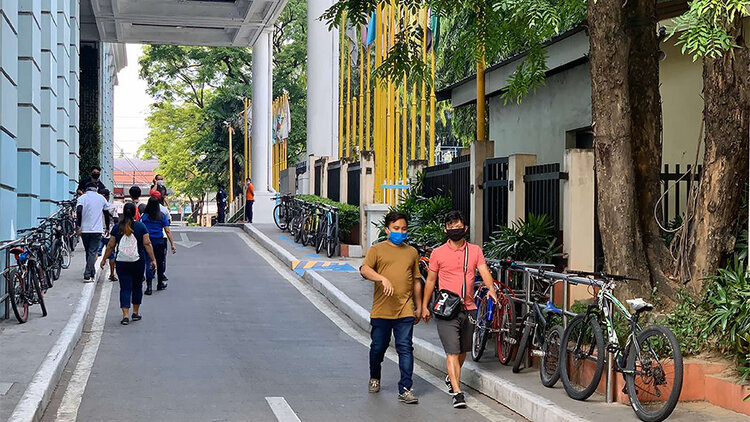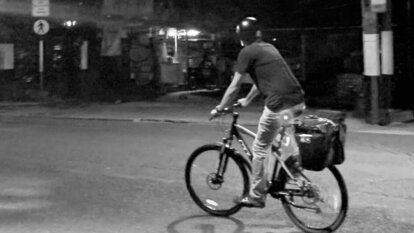Transport and Mobility
Suppression of Freedom of Movement

The new normal can be a good one! A country that provides dignified transportation options for its citizens: A mass public transportation that is reliable, affordable, and safe; Infrastructure and facilities that make walking and biking a viable option. This translates to better mobility and a more livable city for all. The decrease in vehicular traffic due to the Enhanced Community Quarantine (ECQ), presents a rare opportunity to showcase this; For as clear as the skies were, a few weeks into the ECQ, so is the importance of transportation to the life of a city. Unfortunately, before we could begin to take advantage, dark clouds rolled in and public transportation was shut down.
I joined AltMobility in July 2019 when we began our #CommutersNaman advocacy - pushing that national government design transportation solutions considering the welfare of ordinary commuters above all else. This means shifting the balance from car- centric interventions such as the construction of more roads and road widening, to addressing the injustice of stuffing 80% of people on public transportation in 20% of road space in a thoroughfare like EDSA. The solution that would benefit all, regardless of mode of choice: Better rail and bus systems, the creation of protected lanes that promote the use of bikes and other personal mobility devices, to reclamation of sidewalks to encourage walking. At that time, we were dealing with the discrimination against people living outside Metro Manila by way of the provincial bus ban; The discrimination against ordinary commuters by way of the yellow lane policy; The discrimination against motorcycle taxis by suspending their operations without proper study. We were calling for reform through the Legislature as we advocated for the passage of the Magna Carta of Commuters, a commuter bill of rights; We approached the Executive by offering position papers and policy recommendations. While much was desired in terms of our pace, we felt that we were inching our way to a better mobility for all.
As Malacañang announced the ECQ and together with it, the suspension of public transportation, the repercussions of the declaration are clear: It will hit hard on the welfare of ordinary commuters whom we’ve fought hard to defend. While the objectives of the Inter-Agency Task Force for the Management of Emerging Infectious Diseases (IATF-EID) was to curb the number of cases, the suspension of mass public transportation systems will have consequences.
Public transportation are the arteries of cities and, as such, play a critical role in ensuring that the needs of its citizens are met. While Local Government Units (LGU) were directed to provide for this need, LGUs, even in collaboration with national government agencies like the Department of Transportation (DOTr), will not be in a position to replace an already insufficient public transportation system. Add to this the fact that people often live and work in different cities and would need a coordinated transportation system. Something that LGUs are neither equipped to deliver nor was ever in the business to perform - a massive operation that takes significant time to study, organize, and implement.

While it must be balanced with the interest of managing the spread of the virus, mobility remains a basic human right that must be guaranteed. Often, only health workers come to mind when we speak of essential travel of frontline personnel. Yet, there are many others that fall under this category that require as much assistance for transportation.
We (public transportation) are not conduits to disseminating a virus but we’re conduits to disseminating a solution to the epidemic itself by supporting frontline workers, getting hospital workers, food service workers - without that, we can’t function against the virus.
Security personnel, waste management employees, grocery and restaurant staff, delivery workers, among many others need to get to work to continually deliver basic services such as security, sanitation, food supply, etc. Ordinary citizens need to a way to get to and from public markets and groceries, drugstores, hospitals and clinics to seek medical care and recurring treatments such as dialysis, chemotherapy, etc., and other essential travel.
Part of my work exposes me to receive, first hand, the pleas of citizens for help with transportation. And I am presented with a spectrum of needs: From health workers seeking relief from having to walk after straight shifts, a restaurant worker looking to go to work to earn a day’s salary, a senior citizen looking for assistance to buy regular medication, a mother finding a way to bring her son for chemotherapy, to an 8-month pregnant woman asking for a way to her OB. While the city provides shuttle services, it remains insufficient and requires people to walk from several meters to a few kilometers to the nearest transit stop. In transport, we call this the first and last-mile which, in the Philippine context, is fulfilled by tricycles - a transport staple that was included in the list of suspended services.
The 2015 Japan International Cooperation Agency (JICA) study puts the number of people with private vehicles at 12% of the population. This leaves a whopping 88% relying solely on public transportation. The tragedy, it seems, is that even in times of pandemic, policy has favored cars over the welfare of ordinary commuters, the general public. When it shut down public transport it cut off access to work, food, healthcare, and other basic human needs. So, in the course of the ECQ, this question must be raised: Is the crippling of mobility, just as big a threat to the welfare of the people as the virus?
The pandemic has shone the light on so many opportunities that the government has missed in order to provide for better standards of living. However, aside from a new level of difficulty due to the complete shut down of public transportation, there’s actually nothing new: Policies continue to benefit the few, the welfare of ordinary citizens remain dispensable, and the dignity in commuting has stayed illusive. But just as a Chinese proverb says: “The best time to plant a tree was 20 years ago; The second best time is
now,” all is not lost. We continue to call on the government to introduce reforms, not after the pandemic, but today. Otherwise, the new normal, is simply the old normal.